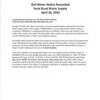Matt's Money: The negative consequences of debt on your health
According to government data and several major credit sources, the average American household has debt over $132,000.
The good news is that 90 percent of that debt is long-term (like a mortgage), Credit card debt accounts for just under $16,000 of that $132,000, or about 12 percent. That’s much better than it was back during the 2009-2009 financial crisis when credit card debt was as high as 22 percent of average household debt.
For many people, debt is a major cause of stress. We all have an innate response to stress, some people launch themselves into action while others ignore the problem. Today’s column is about the former – what should you do about your debt.
First, consider the physical responses we feel during moments of stress -- faster heartbeat, accelerated breathing, tightening of muscles, and higher blood pressure. These are natural, physical responses one may have when their debt load is no longer manageable. In the short term, stress can manifest itself in physical symptoms, such as headaches, fatigue, difficulty sleeping or concentrating, an upset stomach, and general irritability. Longer term, doctors tell us stress can lead to obesity, heart disease, Alzheimer’s disease, diabetes, depression, gastrointestinal problems and asthma.
While money issues can have multiple emotional triggers, studies show that debt is the one that causes the most stress triggers. If you’re experiencing debt-related stress, I recommend attacking the root of the problem. The first step is to acknowledge you have a problem with debt. There may be deeper issues that’s causing your debt to get out of control. But that’s another column.
Financial writer Dave Ramsey is well known for his advice about how to get out of debt – and stay that way.
I don’t always agree with Dave Ramsey, especially how to manage money on the stock market, but I am in total agreement with him on debt. I recommend looking at his website or reading his books when it comes to getting out of debt. I like the way he digs into the spiritual part of it.
Finally, keep your debt in perspective. There’s nothing wrong with a mortgage. But you should have a strategy for paying off your home as soon as possible.
Also, remember that debt default is not the end of the world. If you’re in that situation, seek professional guidance. There are people who can help you. Maybe it’s just be a matter of organization. Or, could it be you just need more discipline? Regardless of the root cause of your debt, just know there are negative chemical reactions the stress is adding to your body. Some of these chemicals can have the same long-lasting consequences as too much alco-hol, tobacco, or drugs.
Securities offered through Royal Alliance Associates, Inc. Member FINRA, SIPC. Advisory services offered through Matt Montgomery, a Registered Investment Advisor not affiliated with Royal Alliance Associates, Inc., 1504 East Rusk, Jacksonville, Texas, (903) 586-3494, * An Index is a portfolio of specific securities (common examples are S&P, DJIA, NASDAQ), the performance of which is used as a benchmark in judging the relative performance of certain asset classes. Indexes are unmanaged portfolios and investors cannot invest directly in an index. Past performance is not indicative of future results.
Please support The Cherokeean Herald by subscribing today!
